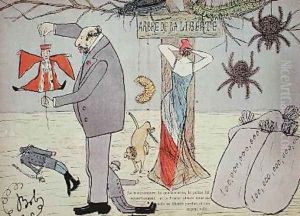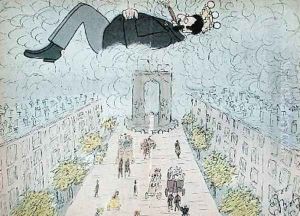Sibylle-Gabrielle de Riquetti de (Gyp) Mirabeau Paintings
Sibylle-Gabrielle Marie Antoinette de Riquetti de Mirabeau, better known by her nom de plume Gyp, was a prolific French writer and socialite active during the late 19th and early 20th centuries. Born on August 16, 1849, in a château in the French region of Poitou, she descended from an illustrious family with a notable lineage, including the famous orator and politician Honoré Gabriel Riqueti, comte de Mirabeau. Her upbringing in the French aristocracy deeply influenced her worldview and literary voice, which was characterized by sharp wit, satirical elegance, and an often controversial perspective on the societal norms of her time.
Gyp's literary career spanned several decades, during which she penned over a hundred volumes, including novels, plays, and essays. Her work often satirized the French aristocracy and bourgeois society, employing humor and irony to critique the social and political issues of the Belle Époque and the Third Republic. Despite her aristocratic background, Gyp's writings displayed an astute awareness of the social injustices and rigid class structures of her era, making her a somewhat paradoxical figure. She was both a product of the aristocracy and a critic of its excesses and prejudices.
Gyp's personal life and public persona were as colorful and controversial as her written work. She was known for her sharp tongue, flamboyant style, and outspoken opinions, which often put her at odds with the more conservative elements of French society. Her salon was a gathering place for the intellectual and artistic elite of Paris, where she hosted figures from various political and cultural spheres, despite her own monarchist leanings.
Despite her popularity and prolific output, Gyp's work has not maintained a prominent place in the literary canon. Critics argue that while her novels and essays provide valuable insights into the social mores and political undercurrents of her time, her reliance on caricature and satire often veered into the realm of the superficial. Nevertheless, for students of French literature and history, Gyp offers a fascinating window into the complexities and contradictions of French society at the turn of the 20th century.
Sibylle-Gabrielle Marie Antoinette de Riquetti de Mirabeau passed away on June 28, 1932. Though her legacy may not be as celebrated as some of her contemporaries, her contributions to French literature and culture, as well as her unique voice and perspective, continue to offer valuable insights into the era she lived in and critiqued.

